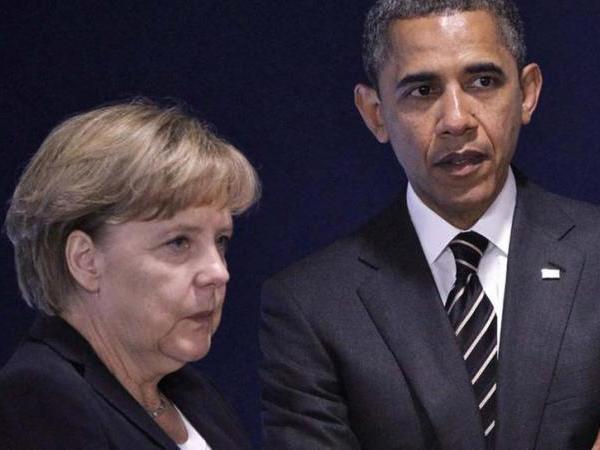 04.06.2015
04.06.2015GERMANY FALLS OUT OF LOVE WITH AMERICA

Anti-Americanism offers cheap German nationalism with a good conscience. Angela Merkel should resist.
By JOHN VINOCUR
Anti-Americanism has become a fungible aspect of German politics. Blaming-the-Amis is now established as hard currency in matters of security, trade and in setting the tone of public discussion—either directly and gratingly, or managed more evasively but with real recognition of this harsh disaffection’s potential as a voter-getter.
Here’s an unavoidable subject, rumbling like a turbine in a shed, that’s likely to be avoided in public when German Chancellor Angela Merkel and President Barack Obama meet in Bavaria at the end of the week in the margins of a G-7 summit.
So what if Bruce Stokes of the Pew Research Institute noted last week that of all Europe’s major countries, Germany’s 51% favorability rating of the U.S. is the second-lowest after Greece? Everybody knows, right, that there’s a Tex-Mex restaurant just around every German corner, and that American expressions continue to affectionately enter the German language at warp speed (the latest must-use word being “bulls—”).
Except that a new level of contempt has been reached in cranking up the old notion of Germany being treated ruthlessly, even victimized by Washington. Joschka Fischer, a former foreign minister, regards this anti-American trend as “strong,” as he said in a magazine interview last week.
Over a period of a month, in trying to set himself up as Germany’s sentry of sovereignty, Sigmar Gabriel, who heads the Social Democratic Party, has accused American security agencies of forcing their German opposite numbers to spy on European officials and companies for them. He says Germans aren’t going to accept lessons or orders, and called on Ms. Merkel to show “backbone” in standing up to America.
Mr. Gabriel is Ms. Merkel’s vice chancellor and economics minister in the coalition government. His targeted outburst in the context of German coalition politics was truly extraordinary. But so was Ms. Merkel’s immediate public response: “We must never lose sight that we need intelligence services. And we need close cooperation between these services.”
Indignation about her deputy’s attack on her? None. Or about his incrimination of the Americans? Not a trace.
Three weeks later, the Social Democrat had picked up five points in a poll tracking approval for his probable run at becoming chancellor in 2017. Ms. Merkel had added two. Which shows how practicing anti-Americanism or keeping quiet about it can work for those German politicians who deal in it or find silence rather than outrage an easier path to profit.
A former U.S. ambassador to Germany, John Kornblum, links the start of the “deep institutionalization” of anti-Americanism to the rule of Gerhard Schröder, Ms. Merkel’s predecessor in the chancellery. Mr. Schröder was the Social Democrat who combined a refusal to send German troops to Iraq with a promise of Germany’s “emancipation” from America.
Ms. Merkel is certainly not anti-American. But she has never repeated anything like her 2003 statement of understanding for the U.S. military stance in Iraq. Those remarks were in the context of a failed national-election campaign she oversaw while Christian Democratic Party chairwoman in 2002.
That election defeat, according to the Frankfurter Allgemeine Zeitung in a staff article last month, became a profound lesson to the chancellor on “how much she had underestimated what a success you could have in Germany—left or right, east or west—by skillfully playing on the anti-American keyboard.”
The newspaper wrote that when she was first confronted with a Yankee-spy tizzy during her 2013 re-election campaign, Ms. Merkel did not choose to shrug off the fuss—homegrown, Snowden-incited paranoia, I’d have called it—but to describe her position with the Schröderish phrase, “Here in Germany, it’s not the Law of the Strong that rules, but the Strength of the Law.”
She was playing righteous and naive. It pointed towards her current precautions in avoiding acknowledgment of the seriousness of anti-Americanism in Germany.
But other Germans do stand up. Heinrich August Winkler, the country’s pre-eminent postwar historian, talks of 2015’s “crude mixture of anti-Americanism and the bizarre romanticizing of German-Russian affinities. It’s an ideology that led Germany into catastrophe and must be rejected sharply and with clarity.”
Tobias Jaecker, who has written a book on the new German anti-Americanism, offered me an updated political definition: “Anti-Americanism today is a cheap means to a new German nationalism with a good conscience.”
Could Mr. Obama have let all this just slip by?
What he has done for sure in turning over Western policy on Ukraine to Ms. Merkel is to tie the American approach to her low level of engagement in confronting Russia. Under Ms. Merkel, Berlin refuses to supply defensive weapons to Kiev or build permanent NATO bases in Poland, policies she regards as in the German interest. Painfully, concerning Russia and the use of military force, these are do-nothing positions that equate with the timidity she rejected 12 and 13 years ago. They have since become those of the Obama administration as well.
In these flaccid circumstances, Mr. Gabriel’s party’s anti-American attacks are certain to continue off and on until the 2017 election. Ms. Merkel should start delegitimizing them. It would help reassure some in her world-wide constituency about where her deepest affinities lie.
Mr. Vinocur is former executive editor of the International Herald Tribune.
Correction: The Pew Research Institute found that Germany’s favorability rating of America is 51%, the second-lowest percentage in Europe. The rating was incorrectly described in an earlier version of this article.
http://www.wsj.com/articles/germany-falls-out-of-love-with-america-1433187158
Return
